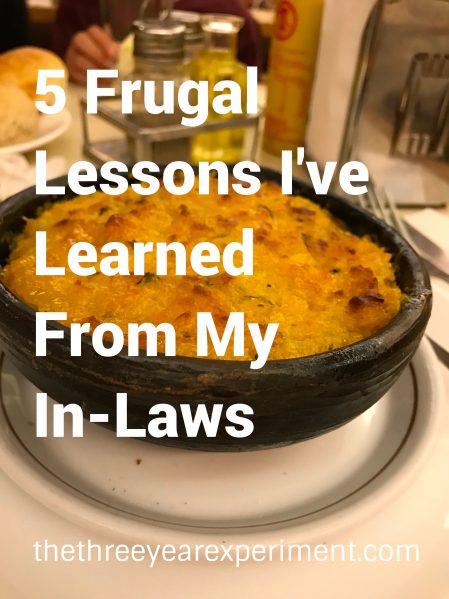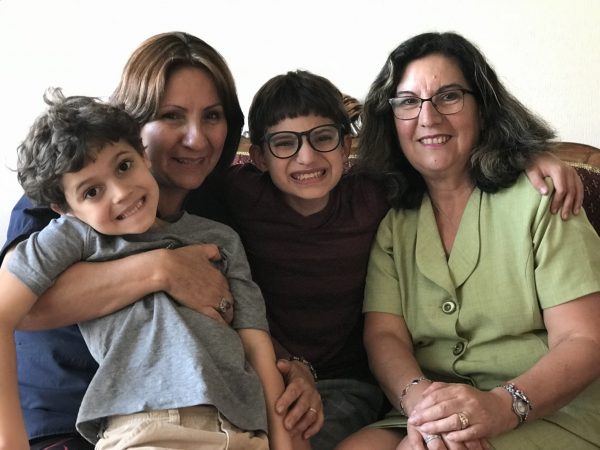Frugality is such an important cornerstone to financial independence. Even if people disdain the word, the concept of spending less than you earn is essential to financial independence. After all, if Nicholas Cage can blow through $150 Million, there’s really little hope for the rest of us, unless we can mind the gap and stretch the space between what we spend and what we earn.
Since my family has a pressing reason to save a bunch of money–our dream of location independence–we are actively working to get better in this area.
I am mediocre at frugality. I didn’t grow up in a particularly frugal household (my parents having eschewed the Ziploc-reusing antics of their Depression-era parents) and although we did control our spending by wearing hand-me-downs and driving our cars to the ground (my dad drove one car he had for 17 years and then gave it to Mr. ThreeYear and me after we moved back to the States), we did not practice those everyday habits of frugal living that come so naturally to some.

Last month, when we were visiting Mr. ThreeYear’s family in Chile, I was reminded that Mr. ThreeYear’s family is naturally frugal in lots of ways, many out of necessity. They grew up with very little, and all of his siblings learned at an early age how to stretch a dollar (or a peso, as the case may be).
According to the Organization for Economic Co-operation and Development, the average annual wage (earnings with taxes removed) per Chilean family was $28,434 in 2016, which would only be equivalent to $18,157 in US purchasing power. In the US it was $60,154, or over two times that. The Central Europe Database reports that Chile’s average gross monthly wages are $667 per employed person (if the former statistic is correct, that would mean there are 3.55 employable adults in each household. That sounds high. Statistics can be misleading).
The long and short of all those statistics are that Santiago is a very expensive city in which to live, and wages are low.
So frugality has been a lifelong practice for my in-laws.
When I first started dating Mr. ThreeYear, I felt very unsure about helping his sisters in the kitchen. After all, when they washed their dishes, they soaped everything up, then rinsed with cold water. I had always thought you just ran the hot water the entire time you were washing up, but Mr. ThreeYear explained that would make the hot water bill too high.
Over time, I’ve watched the way they do things, and learned a couple of tricks to increase my own savings muscle.
Here are five lessons I’ve learned.
Put a little water in the end of the dish soap/shampoo bottle to use up the very last bit
One day, I walked into the kitchen and saw that the soap was mostly water. “What happened?” I asked Mr. ThreeYear. “Oh, I just added a little water to the end of the soap to help use up every last bit.” This practice was repeated with the shampoo, the conditioner, the washing machine detergent, and practically every other liquid good used in the house.
My in-laws use up every last drop of their shampoo and soap. I’ve realized, after adopting the process myself, that not only does it make your soap last for a week more than it would have, on average, but also that it’s a very good environmental practice. The water helps wash the bottle out, so that when we go to recycle it, it’s easier to clean out.
That little bit of soap might represent something like 1/20th of your product, but using up those small amounts add up.
Wash your dishes with soap first, then rinse
As I mentioned, my go-to cleaning method for my dishes was to run the hot water the entire time I soaped up the plates. My sisters-in-law have a drastically more energy-efficient method. They soap up everything, then rinse with cold water, or hot water if things are really greasy, at the very end of the process.
Most families in Chile have a calefont, which is a hot water tank that provides on-demand hot water. Often, they’ll turn the calefont off unless they’re taking a shower to save on hot water costs. So, you’re sometimes forced to rinse your dishes with cold water.
Since the dishes are soaped up well, the germs are taken care of. While I love to sanitize my dishes with hot water, it’s really a waste of resources in many cases, especially when you just have slightly used cups and utensils.
Only use a little meat in your soups or stews
This was a lesson I learned from my mother-in-law. She usually makes hearty Chilean stews like cazuela or charquican. She might use one piece of chicken or a half tray of ground beef in her stews, and use more inexpensive vegetables to fill out the dish. Often, she’ll add potatoes and a handful of rice to her chicken soups, which I always thought was overkill, but the rice gives the soup a thicker consistency and costs very little.

Making one pot meals is also so much easier and so much of a time saver. Soups and stews are filling, easy to make, and easier to clean up than a meal with four or five different components (and corresponding pots and pans).
Use public transportation instead of driving your own car
While this may seem like an obvious trick, I have frequently asked Mr. ThreeYear why his sister takes the bus and metro to work instead of taking their car, especially since her husband could drive her. She has a long commute of over an hour, but she’s taken public transportation for years.
The answer is, gasoline is very expensive in Chile and public transportation is not. Even though it takes her longer to take the bus/metro combo each morning, she saves a lot of money on gas and wear and tear on her car.
While it might be more convenient to take your own car to work, if you have public transportation, you’ll pay a lot less in maintenance and wear and tear on your car. My sister-in-law has had the same car for over ten years, and part of the reason is because they only use it when absolutely necessary.
If you can’t pay for it in cash, you can’t afford it
One of the first lessons I learned from Mr. ThreeYear was that if he didn’t have the cash to purchase something, he wouldn’t buy it. His family buys their cars with cash, outright. Yes, that means they buy used more often than not. And yes, it takes longer to save up the money for the car. But Mr. ThreeYear’s family has a strong inclination to avoid debt, so they won’t buy a relatively big purchase like a car with a loan.
Obviously they took mortgages to buy homes. But all three of Mr. ThreeYear’s older siblings have paid off the mortgages on their homes. They systematically paid down their mortgages and had no other debt payments. They made sure not to stretch themselves too thin.
Saving up for an item and then buying it follows the time-honored practice of delayed gratification, a useful lifeskill to have. I had very little when I was a young 20-something, but I have developed the ability to tell myself “no” or “later” over time. My in-laws’ model has been helpful.
Frugality is a habit that I’m still developing, and while it doesn’t come naturally, these are five areas in which I’ve gotten better, thanks to my frugal Chilean relatives.
Who is your frugal role-model?



Great post Laurie! My frugal role models are my grandparents on my mother’s side. They never wanted money and very much lived a Great Depression inspired lifestyle. My grandmother shopped at dollar stores and sales, never wasting money. They paid cash for their modest house and lived in it for fifty years until they both passed away. I strive to remember their lessons in my own life.
Liz, my maternal grandparents were this way as well. So many frugal people I know stay in the same house all their lives. Moving really does cost a lot of money. I love that your grandparents never wasted money! This is my goal! And I don’t mean never eating out or doing anything fun. But to me, not wasting money is being deliberate about each purchase and not spending on something that doesn’t bring value into your family’s lives.
Hello Laurie, I am here again (probably thanks to your awesome content that resonates with me)
I have personally used the “Put a little water in the end of the dish soap/shampoo bottle to use up the very last bit” more out of environment practice and out of laziness (so I do not have to run the store) than out of only pure frugality. This comes from my education as we did not like waste in general at home.
If you can’t pay for it in cash, you can’t afford it : I really like that one, I have during my years as an adult paid some stuff on credit without really checking if I had the money in the bank account and I hated the feeling to pay the month after so over the years I changed that back to if you do not have cash it, do not buy it. I delayed the pleasure and it has felt even better to save a few months for a larger purchase and then to be able to go to the store and buy it. Right now I am saving some fun money for a Sonos speaker, I could technically buy it today but will buy it when my fun account allows for it :). Just like when I was a kid. Again this comes from what I have grown up with.
Thanks Joney! 🙂 You are so kind!! You are so fortunate to have grown up with such great role-models at home. I love your story about delaying your Sonos purchase. I was just reading the book Happy Money: The Science of Happier Spending and apparently, delaying your purchases makes you happier with them. Something about having to wait, and the sweet anticipation of that actually makes the purchase more meaningful!
Happy Money: The Science of Happier Spending, okay just added to my Goodreads list! 🙂
I’m glad to know I’m not the only one who likes to use up every last bit of product! I roll up the toothpaste tube to squeeze out the last bit. And when I refill the hand soap canister I’ll turn over the big refill container to sit on top of it so that every last bit drains out.
My husband thinks it’s a little crazy, but I think it’s because we grew up differently. My mom is one of 11 kids so she came from a house where everything was used up with maximum efficiency.
Nothing wrong with that you paid for every bit haven’t you? 🙂 Yes Education translates in those habits years later.
I used to scoff at those habits too until I tried them! 🙂 We made our toothpaste last a good two weeks more by squeezing out every last drop! Wow–can you imagine being one of eleven kids? I’m sure your grandparents know a thing or two about stretching a dollar!